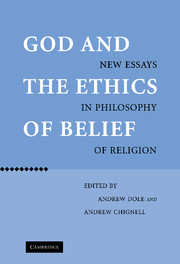Book contents
- Frontmatter
- Contents
- List of Contributors
- Acknowledgments
- The Ethics of Religious Belief: A Recent History
- PART ONE METAPHYSICS: GOD AND CREATURES
- PART TWO EPISTEMOLOGY: GOD AND THE ETHICS OF BELIEF
- PART THREE SOCIAL-POLITICAL PHILOSOPHY: GOD, ETHICS, AND BELIEF
- 8 The Epistemic Authority of Testimony and the Ethics of Belief
- 9 Kant on the Rational Instability of Atheism
- 10 Does Forgiveness Undermine Justice?
- 11 Can Good Christians Be Good Liberals?
- Index
11 - Can Good Christians Be Good Liberals?
Published online by Cambridge University Press: 25 July 2009
- Frontmatter
- Contents
- List of Contributors
- Acknowledgments
- The Ethics of Religious Belief: A Recent History
- PART ONE METAPHYSICS: GOD AND CREATURES
- PART TWO EPISTEMOLOGY: GOD AND THE ETHICS OF BELIEF
- PART THREE SOCIAL-POLITICAL PHILOSOPHY: GOD, ETHICS, AND BELIEF
- 8 The Epistemic Authority of Testimony and the Ethics of Belief
- 9 Kant on the Rational Instability of Atheism
- 10 Does Forgiveness Undermine Justice?
- 11 Can Good Christians Be Good Liberals?
- Index
Summary
It is clear that there are hard times ahead for liberalism in the United States. In the immediate aftermath of the attacks on the World Trade Center and the Pentagon on September 11, 2001, some Muslims, or people taken to be Muslims, were victims of sporadic incidents of religiously intolerant behavior. American habits of religious toleration are now under more intense pressure than they have been at any other time in recent memory. American citizens have, understandably, become fearful and preoccupied with issues of national and personal safety. Many of them seem willing to sacrifice civil liberties or due process of law for the sake of homeland security. Playing to such fears, the Bush administration has adopted policies that are serious threats to liberal values, backing off from their worst features only in the face of domestic or international political pressure. Puffed up by a quick and easy military victory over the Taliban regime in Afghanistan and the Baathist regime in Iraq, it has also become increasingly wrapped up in the arrogance of power. Its threat to liberal political arrangements may be expected to continue for the indefinite future. Liberals will be required to engage in a defensive political struggle in order to limit the damage to the institutions they cherish.
It is in this context that the question of whether good Christians can be good liberals assumes special urgency. Christianity is the most powerful religious force in American life.
- Type
- Chapter
- Information
- God and the Ethics of BeliefNew Essays in Philosophy of Religion, pp. 248 - 276Publisher: Cambridge University PressPrint publication year: 2005



